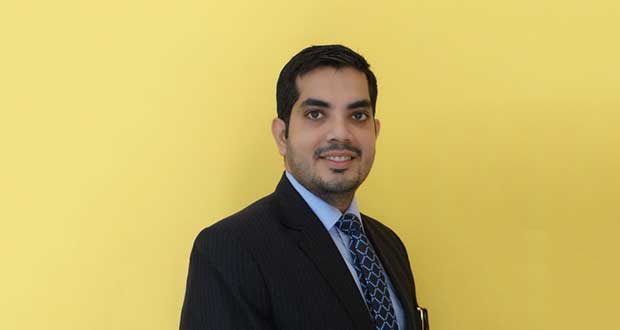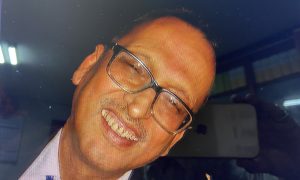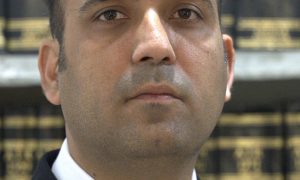Sandeep Chilana graduated from Campus Law Centre, Delhi University in 2005. Thereafter, he practiced litigation at his hometown, in Rudrapur, and later joined AMSS in their tax team. He continues to work at AMSS, and with his expertise in tax law, he is presently a Principal Associate.
We have invited him to share his experience and insights with us in building a career in tax law.
How would you like to introduce yourself to our readers who are mainly law students and lawyers?
Hi! to all the readers of SuperLawyer. I am Sandeep Chilana and I am currently working as a Principal Associate at Amarchand & Mangaldas. At Amarchand, I work with the Tax Team and specialize in indirect tax litigation and advisory services. It is pleasure to reach you all through this forum and share my thoughts and experiences.
I was born and brought up in a small town in Uttaranchal, Rudrapur and I came to Delhi for my graduation in 1999. After graduating in commerce from Kirori Mal College, Delhi University in 2002, I went on to obtain my bachelor’s degree in Law from Campus law Centre, Delhi University in 2005.
I started my career as a litigator in the chambers of Mr. Rajiv Bansal and worked with him for almost 2 years. Thereafter, I joined my father in Rudrapur who specialises in Income Tax & Sales Tax advisory and compliance services, more than a year. I joined Amarchand in 2008 and have been working in the tax team since then.
I am passionate about my work and truly enjoy arguing before the courts and handling complex indirect tax issues. Devising an out of box solution or innovating structuring for clients within the realms of law gives me immense satisfaction.
When and how did you decide to study law? Which universities did you consider for your legal studies? How did you settle for CLC, DU?
[sociallocker] I would not say that law was a natural choice or I always wanted to be a lawyer. While in KMC, I was really interested in pursuing dramatic arts and theatre professionally. After graduation, I realised it was difficult to make a living out of theatre and wanted to have a Plan B to fall back on. Since my father is a practicing lawyer, law was a natural back up plan.
At that time all my theatre rehearsals took place in Delhi. Therefore, I decided to settle for CLC Delhi University for pursuing law. It was during my days at law school that I developed a keen interest in the subject of law.
Do you think being from a non-NLU has ever proved to be a hindrance for you? Many non-NLU students complain that they feel being discriminated against during career opportunities. What has been your experience?
Not really. I strongly believe that our industry only respects technical expertise and everything else is secondary. It is possible that non-NLU students may feel discriminated at campus placement stage. However, from my experience, I want to tell them that in the long run what matters is their understanding of law, analytical abilities and professional integrity.
Many lawyers say that the first year after graduation is the most difficult year for young lawyers. How was your first year after graduation? How did you learn the ropes and what were the biggest challenges you faced?
First year after graduation is indeed most difficult year for us young lawyers. However, it is also the most important year of our profession. It is the year which decides whether we have the endurance to make a successful law professional.
I started my career as a litigator in the chambers of Mr. Rajiv Bansal and worked with him for almost 2 years. That was undoubtedly the most defining period of my career.
The first year was indeed difficult. I quickly realized that practicing law was very different from studying law. There was enormous work pressure and compensations were also nominal to keep us motivated. To top that, life in the courts was very unpredictable.
Mr. Bansal reposed great confidence in me and unlike other 1st year associates I was getting lot of opportunities in the first year itself to independently appear before trial courts and handle miscellaneous hearing before High Court independently.
My biggest challenge in the first year was time management and dealing with stage fright. Arguing before the courts was very different from moot courts and debate competitions in school and college and I needed to adjust quickly. Also, most of the new matters would come in evening with clients or circumstances insisting that the filings be made the very next day. Such short timelines required us to work through the nights to ensure filing the very next day and taught us the art of time management at a very early stage.
You had started working at Bansal & Co. right after graduation, and thereafter you joined Chilana & Chilana Associates. How did you decide to shift from civil and commercial laws to tax laws? Please tell us about your work experience in both these places
The work at Bansal & Co. was varied. In my short span of time spent there, I handled a variety of matters involving labour laws, family laws, intellectual property laws, land acquisition laws and tax laws etc.
By end of 2006, I had decided to specialize in tax laws. There was no better place to learn the basics of tax laws than my father’s chambers in Rudrapur.
Work at Chilana & Chilana Associates was highly focused and involved only tax work. My work at Chilana & Chilana Associates primarily involved preparing tax opinions on income tax and sales tax/VAT issues and drafting appeals or replies to notices.
Working with my father taught me the importance of having an eye for detail in our profession. It was under him that I also understood the necessity of understanding the business of client. Whenever I got too technical, he reminded me that client needs a commercial solution and not a technical paper of legal provisions. I think this is the best advice a lawyer aspiring to specialize in tax laws can get.
You left C&C to join AMSS in their indirect taxes wing. What motivated this shift? What does it take to get job at AMSS at that stage?
When I left Mr. Bansal to join Chilana & Chilana Associates, I was hopeful that I would get opportunities to return to Delhi and work with main stream law firms or accounting firms, once I understood the basics of tax laws.
AMSS happened by sheer chance as if it was destined. I was not aware that AMSS had recently started tax practice. I was given an offer by one of the big four accounting firms to work in the indirect tax team. On the day I went to collect my offer letter, I bumped into an old college friend who had got a call from AMSS for an interview for a position in the tax team. She was very kind to forward my resume to AMSS HR and get me an interview as well, for the same position.
Mr. Aseem Chawla, who was the tax partner at AMSS during the relevant time, interviewed me. The interview was primarily focused on work ethics, my litigation experience and the nature of tax assignments I have handled besides the obvious question, why I wanted to leave family practice.
My father being a tax lawyer appeared to be the biggest challenge for me to crack that interview with AMSS. There was a presumption that sooner or later I would go back to join my father’s practice.
However, Mr. Chawla identified with my point of view and the career path I had chalked out for myself. To my delight, I got a call from AMSS HR in the same week informing me about my selection. I was to join as a fresher associate in the Tax Team of AMSS.
I guess my initial litigation experience coupled with my exposure to basics of tax laws worked in my favour. Also, my willingness to discount all my past experience to join as a fresher gave me an edge over the other candidates.
Would you say your undergraduate B.Com degree has been helpful in your career? When did you actually experience the learning curve in tax law?
Undoubtedly yes. It is almost impossible to specialise in tax laws without having the ability to decode financial statements and juggle with numbers. The B.Com degree gave me exposure to the accounting principles and made me affable to balance sheets and financials.
I developed interest in tax laws while pursuing LL.B itself. I chose the optional paper of tax in my second year of law school and our professor Ms. Neeru Nakra ensured that everyone in the class enjoyed studying the seemingly boring tax laws. However, the actual learning curve in tax laws happened only after I joined Chilana & Chilana Associates.
How do you say one can gain expertise in tax law? What does it take to be a good tax lawyer?
The only way to gain experience in tax laws is to work with a tax lawyer or an accounting firm. We may not get an opportunity to work with a big firm directly but we must not lose hope. Hone your tax skills with independent practitioners or mid-level firms and wait for the right opportunity.
Tax is a very dynamic subject. Hundreds of notifications and circulars are issued by the tax department every week. Tax laws get amended almost every year and the courts across India have different points of view on the same question of law. The only way one can be a good tax lawyer is by ensuring that you are constantly evolving and investing atleast 2 hours every week on knowledge management.
Is the work significantly different from other transactional lawyers?
Yes, practicing tax laws is very niche and significantly different from any other practice. Every litigation and advisory assignment is significantly different from the other. There are hardly any templates to start with. What differentiates a tax practice from regular transactional advisory work is that it never gets monotonous for a lawyer practicing tax laws.
How much of your work does involve litigation, if at all?
My work involves a good mix of litigation and advisory work. I have been appearing before various High Courts, Tribunals and Commissioners across the country on various indirect tax issues.
Recently, I independently argued a very technical and high stake matter pertaining to taxability of domain name registration before the Customs, Excise & Service Tax Appellate Tribunal, Mumbai, and got a favourable order for client.
Tell us a bit about work culture at AMSS tax team.
Work culture at the AMSS Tax Team is highly competitive which induces a positive and productive environment. Most of the work handled by Tax Team at AMSS is very niche and high end, which continues to aspire and drive us towards professional excellence.
People often complain about the highly skewed work-life balance at the top law firms. What is your workday like? How do you maintain your work-life balance?
Being a lawyer is undoubtedly a high-stress career that demands far more than fair share of our time. Most of our assignments are urgent and require time bound delivery. Quite often than not, we end up spending more than 12 hours a day in our offices. However, it is a conscious choice for most of us.
One of the most important tools to manage work-life balance is time management, the ability to manage and keep a tab on the time and efficiencies, not only of your own but that of your team as well. I do try my best to regulate my time in the most efficient manner possible and spend quality time with my family. However, I must admit that my family understands the kind of pressures I work in and is really supportive of my professional commitments. Without their support, it would have been impossible for me to give my best to my profession.
What would be your message to our young readers who want to pursue a career in tax laws?
I would want to tell the young readers and budding lawyers that while their seniors would provide them sufficient exposure and training on the subject matter of their interest, the ultimate responsibility for their professional development rests on them only.
It is not uncommon to feel disoriented in the first year of being a tax lawyer. Unlike other laws, tax laws are highly complex and require sound understanding of basic principles before you can start understanding and enjoying the complexity of the issues involved. Be patient till the time you are sure that you have mastered the basic principles.
If time permits, a budding tax lawyer must consider attending training sessions and coaching classes organized by Institute of Chartered Accountants of India (ICAI) on tax laws for aspiring Chartered Accountants. These are really helpful in understanding the basic concepts of tax laws and make a great foundation for any tax professional.
Once the basic understanding of tax laws is in place, it is important to remain focused and constantly invest time on self-development and knowledge management. It is also important to master the art of understanding the commercial reasons for any transaction to be able to provide a better solution to client.
Besides legal expertise, it is important to develop the work ethics which are paramount for any professional to be successful, most importantly being, determination, patience and integrity.[/sociallocker]


























